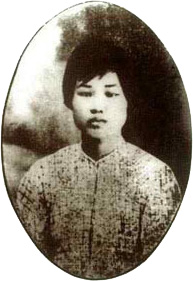Yang Kaihui
| Yang Kaihui | |
|---|---|
 |
|
| Born |
6 November 1901 Banchang, Changsha County, Hunan, Qing Empire |
| Died | 14 November 1930 (aged 29) Changsha, Hunan, China |
| Spouse(s) | Mao Zedong (m. 1920–30) |
| Children |
Mao Anying (1922–1950) Mao Anqing (1923–2007) Mao Anlong (1927–1931) |
Yáng Kāihuì (simplified Chinese: 杨开慧; traditional Chinese: 楊開慧; courtesy name: Yúnjǐn (simplified Chinese: 云锦; traditional Chinese: 雲錦); November 6, 1901 – November 14, 1930) was the second wife of Mao Zedong, whom he married in 1920. She had three children with Mao Zedong: Mao Anying, Mao Anqing, and Mao Anlong. Her father was Yang Changji, the head of the Hunan First Normal School and one of Mao’s favorite teachers.
Yang Kaihui was born in the small village of Bancang in Changsha, Hunan Province, on November 6, 1901. Her name meant "Opening Wisdom", although she came to be nicknamed Xia, meaning "Little Dawn." Her father was Yang Changji, a school teacher and leftist intellectual, while her mother was Yang Zhenxi, while she had a brother three years older than her, Yang Kaizhi. Through his teaching of ethics at the First Normal School of Changsha, Changji had become a father figure to a pupil named Mao Zedong, later writing in his journal that "it is truly difficult to imagine someone so intelligent and handsome" as him. A friendship developing, in summer 1916, Mao was invited to spend several days at Yang's Bancang home, walking twenty miles in straw sandals in order to get there. On this occasion, he did not talk to either Zhenxi or Kaizhi, instead bowing his head to them as a mark of respect.
Yang Changji gained a job in Peking, moving his family to the city. Mao arrived in Peking on August 19, 1918 with several like-minded friends from Hunan; upon arrival, they stayed in the Yang's small house in the north of the city. Here, Mao met Kaihui again, with the two discovering a mutual attraction. A friend who knew Kaihui at the time described her as "small in stature and round-faced, with deep-set eyes and pale white skin", and her appearance impressed both Mao and his friends. Kaihui later related that she had "fallen madly in love with him already when I heard about his numerous accomplishments" but did not make her feelings immediately known. She kept "hoping and dreaming" that he shared her feelings and decided that she would never marry anyone but him.
...
Wikipedia
